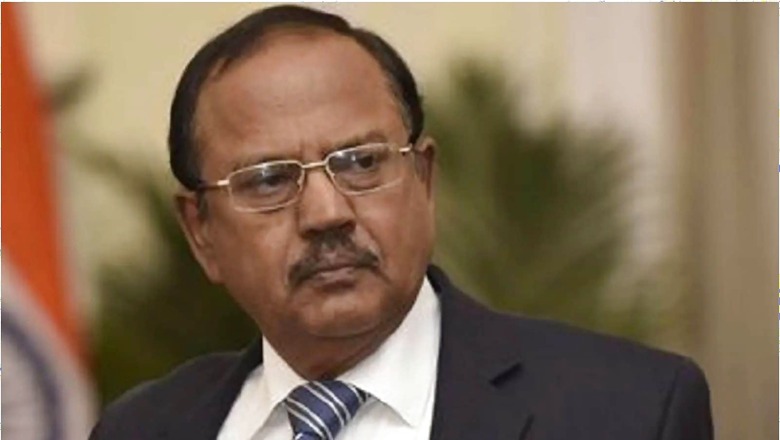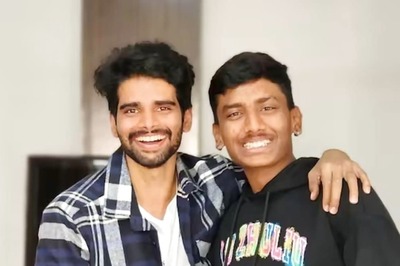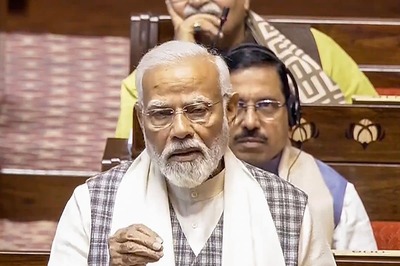
views
There are increasing international rivalries, competitions and clash of interest in the Indian Ocean Region (IOR) and it is important for India to protect this area, National Security Advisor Ajit Doval said on Thursday.
“Earlier, it was an ocean of peace. The geo-political scenario in the IOR is changing now,” Doval said at the first-ever meeting of the Multi Agency Maritime Security Group (MAMSG) organised to discuss important policy matters impacting maritime security. Its members include from key central ministries, agencies and security forces dealing with maritime affairs and State Maritime Security Coordinators representing all 13 coastal states and Union Territories.
The meeting was chaired by the National Maritime Security Coordinator Vice Admiral G Ashok Kumar (Retd), who assumed charge as the country’s first NMSC on February 16. Navy chief Admiral R. Hari Kumar and Deputy NSAs from NSCS were also present.
Addressing the senior officials, Doval said while IOR is a great asset to India, its vulnerabilities are directly proportional to its assets.
“The more we develop and create assets, the more trade and commerce will increase and greater will be the vulnerability and security in the maritime domain,” he said, adding that emerging future threats will be from seas, cyber and space domains.
He said threats of yesteryears will continue playing a role as well, adding that non- traditional security threats such as piracy, drug running and human trafficking continue posing challenges.
“A well-integrated system is needed. From the beat constable to the officers at the national level, everyone has a critical role to play. Any lapse anywhere can be a problem,” he said.
Stating that the NMSC is part of the larger security apparatus, which is connected to the states through the SMSCs, Doval said it is important that the connectivity is seamless.
“Denying accessibility to foreign intelligence agencies is an important aspect. Economic interests and coastal infra are critical to exploit our maritime resources,” he said.
Doval highlighted that the specific emphasis of maritime security in the national security discourse.
“Conventional borders had their pre-eminence because wars were fought on the land borders, but maritime and land borders are different,” he said.
“Maritime borders cannot be fenced, but we can’t have the concept of zero percent tolerance for intrusion. So, we need have technology and other ways to counter this,” he said.
The concept of sovereignty on the land is territorial and integral. In the maritime security front, the concept of sovereignty is in a calibrated fashion where the territorial waters are like a sovereignty territory but as we go out to the contiguous zones and EEZ and further, there are clear demarcations of the rights and duties we have as a nation,” he said.
“Also, the disputes and settlements that are in the land border are bilateral in nature and are decided by the two parties across the table, but maritime borders are multilateral in construct,” he said.
“A nation cannot take unilateral decision in the maritime domain. The process is complex,” he said.
Doval said India’s interests in the maritime domain are very deep.
“We have strategic, geo-political interests (in the maritime domain) and seas are areas of rivalries, adversities. India has a unique maritime advantage. It is the largest littoral state in IOR. Its central geography plays an importance role. It has 1,300 plus islands,” he said.
He also said the seven important maritime neighbours of India are also a critical factor in India’s international construct.
“We have also certain responsibilities towards our maritime neighbours, such as in disaster management, security assistance and such other things,” he said.
The NMSC has been appointed to bring synergy internally and externally, he said.
Doval said the recent initiatives of the government such as the Colombo Security Conclave where the number of member states has been expanded. “We propose to expand it in the domains of coastal shipping, protection of economic and maritime interests and counter terrorism and anti-human trafficking operations,” he said.
“Our responsibility as a premier maritime power is extremely important,” he said.
“It’s not that in the past, there were no efforts or desire to build a comprehensive maritime security, but the challenges and resources were less. We were not rising to occasion,” he said.
He said coordination is a result of operational action. “It has a system, but needs further refinement. SOPs need to be built, the lexicon has to be common and there is a requirement of a common operational picture,” he said.
“We are destined for greater things. India’s time will come. We, as a nation have to be strong. Coastal and maritime security will play an important role in this,” he said.
In a major decision to reform coordination of maritime security affairs at the apex level, in November last year, the Cabinet had approved the creation of the post of NMSC, under the NSA, at the National Security Council Secretariat.
This reform is intended to ensure a seamless approach to India’s maritime security cutting across geographical and functional domains. The constitution of the MAMSG by bringing together diverse stakeholders at the Centre and coastal States/UTs is a significant step in that direction.
At the inaugural meeting, a number of crucial policy issues on maritime security will be taken up, including mapping of existing orders and policies on maritime security to identify gaps, review of standard operating procedures for maritime contingencies, security of ports and coastal infrastructure, creation of a national maritime database, capacity building of coastal States and UTs, promotion of blue economy, etc. A separate session was dedicated to discussion with State Maritime Security Coordinators.
The MAMSG is envisaged to provide a standing and effective mechanism to ensure coordination of all aspects of maritime security including coastal and offshore security, as well as fill the institutional, policy, technological and operational gaps in meeting present and future security challenges.
Importantly, the group will also address maritime contingencies requiring an urgent and coordinated response.
Read all the Latest News , Breaking News , watch Top Videos and Live TV here.



















Comments
0 comment